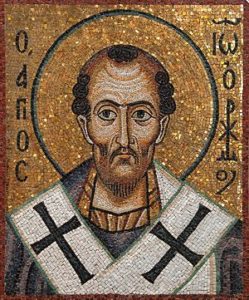
PRAYER IS A GREAT WEAPON, CHRYSOSTOM: How does it happen that wickedness is transcended in forgetfulness? From the remembrance of good things, from the remembrance of God. If we continually remember God, we cannot remember God, we cannot remember those things also. For, the psalmist says, “When I remember you upon my bed, I thought upon you in the morning dawn” [Psalm 63:6]. We ought then to have God always in remembrance, but then especially, when thought is undisturbed and when by means of that remembrance one is able to condemn himself, when one can retain things in memory. For in the daytime, indeed, if we do remember, other cares and troubles, entering in, drive the thought out again; but in the night it is possible to remember continually, when the soul is calm and at rest; when it is in the harbor and under a serene sky. “The things which you say in your hearts are grieved for on your beds,” the psalmist says [Psalm 4:4]. For it were indeed right to retain this remembrance through the day also. But inasmuch as you are always full of cares and distracted amidst the things of this life, at least then remember God on your bed. At the morning dawn meditate upon God. If at the morning dawn we meditate on these things, we shall go forth to our business with much security. If we have first made God propitious by prayer and supplication, going forth thus we shall have no enemy. Or if you should, you will laugh him to scorn, having God propitious. There is war in the marketplace; the affairs of every day are a fight, they are a tempest and a storm. We therefore need arms, and prayer is a great weapon. We need favorable winds; we need to learn everything, so as to go through the length of the day without shipwrecks and without wounds. For every single day the rocks are many, and oftentimes the boat strikes and is sunk. Therefore have we especially need of prayer early and by night. ON THE EPISTLE TO THE HEBREWS 14.9
Oden, Thomas, General Editor Ancient Christian Commentary on Scripture: New Testament X: Hebrews 129
